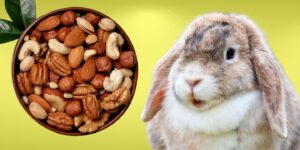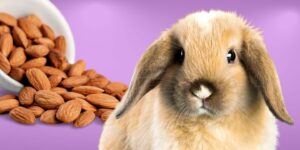The short answer is no, rabbits should not eat peanuts. Peanuts are not a part of a rabbit's natural diet and can be harmful to their health. In this article, we will explore the reasons why peanuts are bad for rabbits, discuss what rabbits should eat instead, and provide some guidelines on portion sizes and monitoring your rabbit's health.
Nutritional Content of Peanuts
Peanuts are high in both fat and protein, which can lead to health problems in rabbits. They are also prone to contamination by aflatoxins, which are toxic to rabbits. Here's a closer look at these concerns:
Fat content
Peanuts contain a high amount of fat, which can contribute to obesity in rabbits if consumed in large quantities.
Protein content
Rabbits have a low requirement for protein in their diet, and too much protein can cause kidney and liver problems.
Aflatoxins
Aflatoxins are toxic compounds produced by certain molds that can grow on peanuts. These toxins are harmful to rabbits and can lead to serious health issues.
Other potential allergens and toxins
Peanuts may also contain other allergens or toxins that could cause allergic reactions or other health problems in rabbits.
Rabbit Digestive System and Peanuts
Rabbits are herbivores, which means their digestive systems are designed to process plant materials, not the high-fat and high-protein content found in peanuts.
Differences in herbivore and omnivore digestion
Rabbits have a specialized digestive system that is efficient at breaking down fibrous plant material. Their diets should be high in fiber and low in fat and protein.
The potential for gastrointestinal blockages
Peanuts can be difficult for rabbits to digest and may cause gastrointestinal blockages.
The impact of high-fat and high-protein foods on rabbit digestion
Feeding rabbits high-fat and high-protein foods like peanuts can disrupt their digestive balance and cause health issues.
Health Risks of Feeding Rabbits Peanuts
Feeding rabbits peanuts can lead to several health risks, including obesity, gastrointestinal issues, kidney and liver problems, and allergic reactions.
Obesity
The high-fat content in peanuts can contribute to weight gain and obesity in rabbits, which can lead to other health problems.
Gastrointestinal issues
As mentioned earlier, peanuts can be difficult for rabbits to digest and may cause gastrointestinal blockages or other stomach issues.
Kidney and liver problems
A diet that is too high in protein can put a strain on a rabbit's kidneys and liver.
Allergic reactions
Some rabbits may be allergic to peanuts or other allergens contained within them, causing adverse reactions after consumption.
Safe Foods for Rabbits
Instead of peanuts, rabbits should be fed a diet that is primarily composed of hay, supplemented with fresh vegetables and fruits, and a limited amount of commercial rabbit pellets.
Importance of hay
Hay should make up the majority of a rabbit's diet, as it provides the necessary fiber for proper digestion and overall gut health.
Fresh vegetables and fruits
Safe options for rabbits include leafy greens like lettuce, kale, and spinach, as well as carrots, bell peppers, and a limited amount of fruits such as apples and bananas. Unsafe options that should be avoided include onions, garlic, and avocado.
Commercial rabbit pellets
Commercial rabbit pellets can be beneficial, providing essential nutrients in moderation. However, they should not be the primary component of a rabbit's diet.
Monitoring Your Rabbit's Diet and Health
Keep an eye on your rabbit's weight, food intake, overall health, and watch for signs of an unhealthy diet or health problems. Schedule regular vet check-ups to ensure your rabbit is staying healthy.
Signs of a healthy rabbit
A healthy rabbit will have a good appetite, a healthy weight, and be active and alert.
Signs of an unhealthy diet or health problems
Indications of an unhealthy diet or health issues in your rabbit may include weight loss or gain, lethargy, diarrhea, or constipation.
Alternatives to Peanuts for Rabbit Treats
Instead of peanuts, consider offering your rabbit healthy treat options such as small pieces of fruit or vegetables. Remember to use treats in moderation and not as a substitute for a balanced diet.
Conclusion
In summary, peanuts are not a suitable food for rabbits and should be avoided. A rabbit's diet should consist mainly of fresh hay, supplemented with small amounts of fresh vegetables and fruits, and a limited amount of commercial rabbit pellets. By following these guidelines and monitoring your rabbit's diet and health, you can help ensure that your rabbit lives a long and healthy life.




